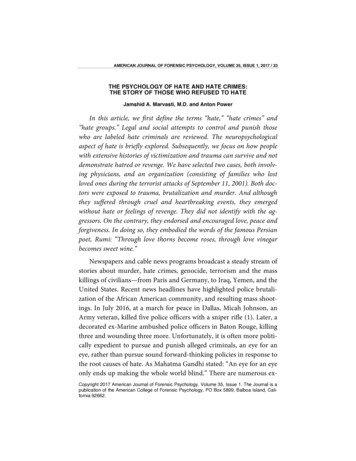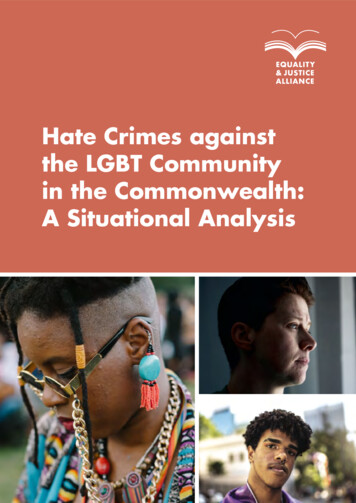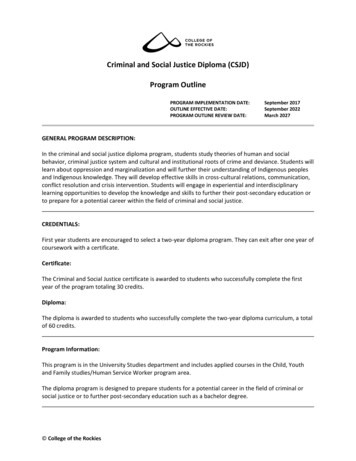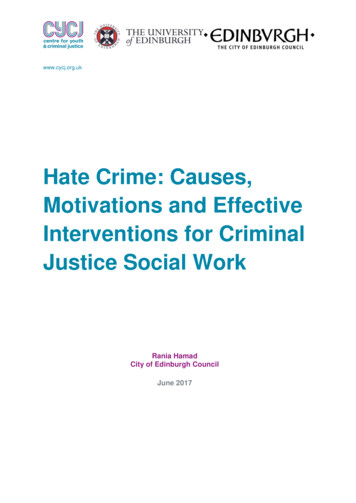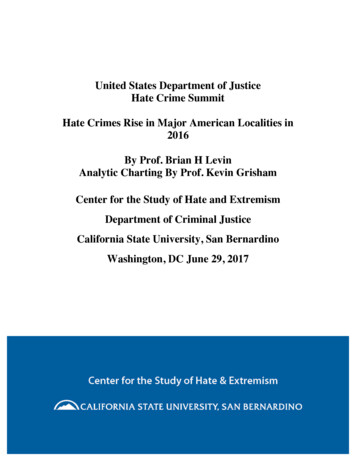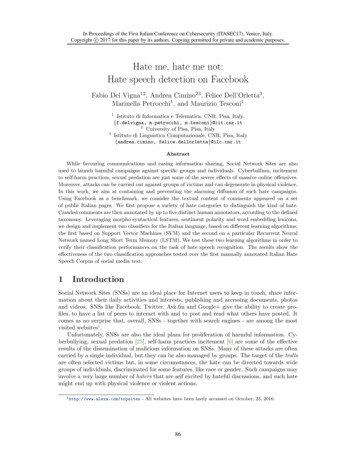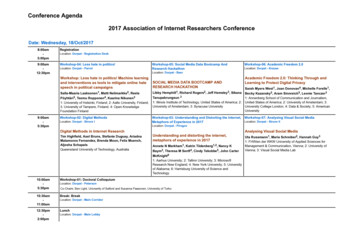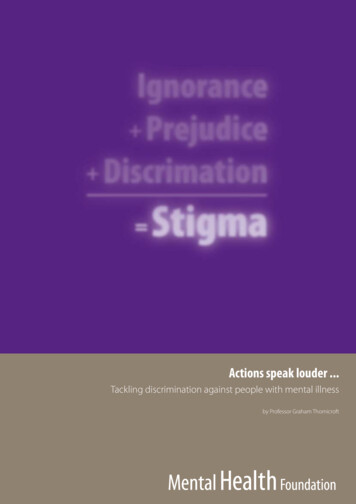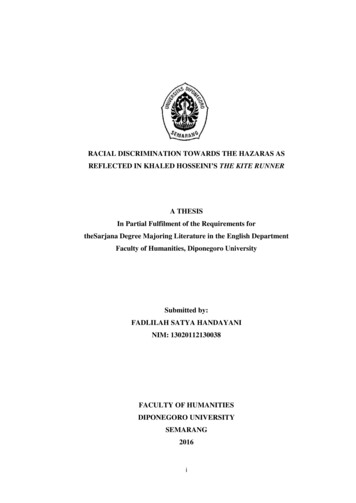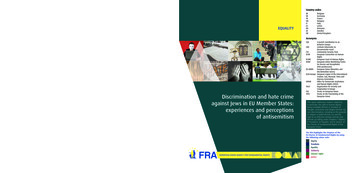
Transcription
doi:10.2811/45930For information on FRA’s data collection onantisemitic incidents and hate crime, aswell as its work on Holocaust and humanrights education, see:EQUALITYFRAHELPING TO MAKE FUNDAMENTAL RIGHTS A REALITY FOR EVERYONE IN THE EUROPEAN UNIONAntisemitismTK-01-13-467-EN-CEUROPEAN UNION AGENCY FOR FUNDAMENTAL RIGHTSHElping to MakE fUndaMEntal rigHtSa rEality for EvEryonE in tHE EUropEan UnionCountry PING TO MAKE FUNDAMENTAL RIGHTS A REALITY FOR EVERYONE IN THE EUROPEAN UNIONANNUAL REPORT2012yFor its role in advancing peace, reconciliation, democracy and human rights in Europe, the European Union (EU) was awardedthe Nobel Peace Prize in 2012, a vote of confidence in the project of European integration and an eloquent acknowledge‑ment of what a hard‑won achievement it represents. It was awarded, fittingly, at a time of testing, when the values thatknit the EU together felt the strain of socio‑economic, political and constitutional crises.aourglaaaKingdomThe annual report also covers key EU initiatives that affect fundamental rights. The European Commission launched a drivein 2012 to modernise the EU’s data protection framework, the most far‑reaching reform of EU data protection legislationin 20 years. The EU also pushed ahead with the increased use of databases and information technology tools for bordermanagement and visa processing. It took steps to enable non‑national Union citizens to participate in European Parliamentelections, enhanced victims’ rights, successfully negotiated asylum instruments which were under review and focused onthe challenges and obstacles facing older persons, including those with disabilities, in its 2012 Year of Active Ageing.HIGHLIGHTS22011The annual report looks at fundamental rights‑related developments in asylum, immigration and integration; border controland visa policy; information society and data protection; the rights of the child and protection of children; equality andnon‑discrimination; racism and ethnic discrimination; participation of EU citizens in the Union’s democratic functioning;access to efficient and independent justice; and rights of crime victims.FOCUSental rights:l and policy2nts in 2011and the annual reporthlights 2012 – are available inand German. These documentsr download at: fra.europa.eu.This year’s annual report Focus section examines times of crisis from the perspective of fundamental rights.It acknowledges that the crises have prompted discussions about the nature, scope and future of the EU, whilereaffirming the principles at the EU’s heart, including adherence to fundamental rights.Fundamental rights: challenges and achievements in 2012Against a backdrop of rising unemployment and increased deprivation, this FRA Annual report closely examines the situa‑tion of those, such as children, who are vulnerable to budget cuts, impacting important fields such as education, healthcareand social services. It looks at the discrimination that Roma continue to face and the mainstreaming of elements of extre‑mist ideology in political and public discourse. It considers the impact the crises have had on the basic principle of the ruleof law, as well as stepped up EU Member State efforts to ensure trust in justice systems.andsEuropean Convention on Human RightsCJEUCourt of Justice of the European Union(CJEU is also used for the time predatingthe entry into force of the Lisbon Treatyin December 2009)EASOEuropean Asylum Support OfficeECRIEuropean Commission against Racismand IntoleranceECtHREuropean Court of Human RightsEDPSEuropean Data Protection SupervisorEU‑MIDISEuropean Union Minorities andDiscrimination SurveyFRAEuropean Union Agency for FundamentalRightsFRANETNetwork of Legal and Social ScienceExperts (FRA)LGBTLesbian, gay, bisexual and transgenderNHRINational Human Rights InstituteNGONon‑governmental organisationTEUTreaty on European UnionTFEUTreaty on the Functioning of the EUUNUnited NationsNote: A list of international and regional human rights conventionsand their abbreviations can be found in Chapter 10.Fundamental rights:challenges andachievements in 2012The FRA highlights the titles of theEU Charter of Fundamental Rights by usingthe following colour code:DignityFreedomsEqualitySolidarityCitizens’ rightsISSN 1831-0362JusticeFRA - EUROPEAN UNION AGENCY FOR FUNDAMENTAL RIGHTSSchwarzenbergplatz 11 – 1040 Vienna – AustriaTel. 43 1580 30‑0 – Fax 43 1580 30‑699fra.europa.eu – ncytwitter.com/EURightsAgencyECHRCITIZENS’ RIGHTSTAL RIGHTSEUROPEAN UNION AGENCY FOR FUNDAMENTAL RIGHTSAntisemitism casts a long shadow on Jewish people’s chances to enjoy their legally guaranteed rights to human dignity,freedom of thought, conscience and religion, and non-discrimination. The daily insults, discrimination, harassmentand even physical violence, with which Jewish people across the European Union (EU) must contend, show few signsof abating, despite EU and EU Member States’ best efforts. Nevertheless, little information exists on the extent andnature of antisemitic crimes to guide policy makers seeking to effectively fight these crimes. This FRA survey is thefirst-ever to collect comparable data on Jewish people’s experiences and perceptions of antisemitism, hate-motivatedcrime and discrimination across a number of EU Member States, specifically in Belgium, France, Germany, Hungary,Italy, Latvia, Sweden and the United Kingdom. Its findings reveal a worrying level of discrimination, particularly inemployment and education, a widespread fear of victimisation and heightening concern about antisemitism online.By shining light on crimes that all too often remain unreported and therefore invisible, this FRA report seeks to helpput an end to them.Discover the pastfor the futureThe role of historical sites and museumsin Holocaust education and humanrights education in the EUCITIZENS’ RIGHTSTK- - - -EN-CHuman rights education atHolocaust memorial sitesacross the European Union:An overview of practicesExcursion to the past –teaching for the future:Handbook for teachersDiscrimination and hate crime against Jews in EU Member States: experiences and perceptions of eHungaryItalyLatviaRomaniaSwedenUnited KingdomAcronymsSummary overview of the situation inthe European Union 2002–2012November 2013BEDEFRHUITLVROSEUKDiscrimination and hate crimeagainst Jews in EU Member States:experiences and perceptionsof antisemitismA Jewish Contribution to anInclusive EuropeCIDICentrum Informatie enDocumentatie IsraelCSTCommunity Security TrustECHREuropean Convention on HumanRightsECtHREuropean Court of Human RightsEUMCEuropean Union Monitoring Centrefor Racism and Xenophobia(FRA predecessor)EU-MIDISEuropean Union Minorities andDiscrimination SurveyILGA-Europe European region of the InternationalLesbian, Gay, Bisexual, Trans andIntersex AssociationODIHROffice for Democratic Institutionsand Human Rights (OSCE)OSCEOrganization for Security andCooperation in EuropeTEUTreaty on European UnionTFEUTreaty on the Functioning of theEuropean UnionThis report addresses matters related to,in particular, the right to human dignitybeing inviolable (Article 1), freedom ofthought, conscience and religion (Article 10),non-discrimination, including on the groundsof religion or belief (Article 21), and theright to an effective remedy and fair trial(Article 47) falling under Chapters I ‘Dignity’,II ‘Freedoms’, III ‘Equality’ and IV ‘Justice’ ofthe Charter of Fundamental Rights of theEuropean Union.The FRA highlights the chapters of theEU Charter of Fundamental Rights by usingthe following colour code:DignityEUROPEAN UNION AGENCY FOR FUNDAMENTAL RIGHTSFRA – EUROPEAN UNION AGENCY FOR FUNDAMENTAL RIGHTSSchwarzenbergplatz 11 – 1040 Vienna – AustriaTel.: 43 158030-0 – Fax: 43 158030-699fra.europa.eu – UROPEAN UNION AGENCY FOR FUNDAMENTAL RIGHTSCitizens’ rightsJustice
European Union Agency for Fundamental RightsDiscrimination and hate crime against Jews in EU Member States: experiences and perceptions of antisemitism2013 — 76 p. — 21 x 29.7 cmISBN 978-92-9239-262-8doi:10.2811/45930A great deal of information on the European Union Agency for Fundamental Rights is available on the Internet.It can be accessed through the FRA website at fra.europa.eu.Europe Direct is a service to help you find answersto your questions about the European Union.Freephone number (*):00 800 6 7 8 9 10 11(*) Certain mobile telephone operators do not allow access to 00 800 numbers or these calls may be billed.Photo (cover & inside): Shutterstock and CC CreativeCover (from top left to bottom right): Shutterstock (1, 3, 4, 6, 7, 8, 9 and 10) and CC Creative Commons (2 and 5)Inside: Shutterstock (pp. 11, 15, 29, 41, 53 and 59) and CC Creative Commons (pp. 11, 41 and 53)More information on the European Union is available on the Internet (http://europa.eu).FRA – European Union Agency for Fundamental RightsSchwarzenbergplatz 11 – 1040 Vienna – AustriaTel.: 43 158030-0 – Fax: 43 158030-699Email: info@fra.europa.eu – fra.europa.euCataloguing data can be found at the end of this publication.Luxembourg: Publications Office of the European Union, 2013ISBN 978-92-9239-262-8doi:10.2811/45930 European Union Agency for Fundamental Rights, 2013Reproduction is authorised, except for commercial purposes, provided the source is acknowledged.Printed in ItalyPrinted on process chlorine-free recycled paper (PCF)HOW TO OBTAIN EU PUBLICATIONSFree publications: via EU Bookshop (http://bookshop.europa.eu); at the European Union’s representations or delegations. You can obtain their contact details on the Internet(http://ec.europa.eu) or by sending a fax to 352 2929-42758.Priced publications: via EU Bookshop (http://bookshop.europa.eu).Priced subscriptions (e.g. annual series of the Official Journal of the European Union and reports of casesbefore the Court of Justice of the European Union): via one of the sales agents of the Publications Office of the European index en.htm).
EUROPEAN UNION AGENCY FOR FUNDAMENTAL RIGHTSDiscrimination and hate crimeagainst Jews in EU Member States:experiences and perceptionsof antisemitism
ForewordAntisemitism is one of the most alarming examples of how prejudice can endure, lingering on for centuries, curbingJewish people’s chances to enjoy their legally guaranteed rights to human dignity, freedom of thought, conscienceand religion or non-discrimination. Despite European Union (EU) and Member States’ best efforts, many Jews acrossthe EU continue to face insults, discrimination, harassment and physical violence that may keep them from livingtheir lives openly as Jews. Nevertheless, there is little concrete information available on the extent and nature ofantisemitism that Jewish people encounter in the EU today – whether at work, in public places, at school or in themedia – information critical to policy makers seeking to craft effective solutions to bring an end to such discrimination.The European Union Agency for Fundamental Rights (FRA) has reported on the available official and unofficial dataon antisemitic incidents in its Annual report on Fundamental rights: challenges and achievements, as well as ina separate annual working paper – Antisemitism: Summary overview of the situation in the EU – which presentstrends on the available data covering up to 10 years. This provides a long-term view of the developments concerningantisemitic incidents. These reports are part of FRA’s body of work on hate crime, shining light on the experiencesof various groups such as Lesbian, Gay, Bisexual and Transgender (LGBT) persons, immigrants and ethnic minorities,and persons with disabilities.The available data fail to answer many questions, however, which are of keen interest to policy makers looking toimprove responses to antisemitic acts. Effective solutions require information on the types of antisemitic incidents,the context in which they take place and the reasons why many incidents are not reported at all, indeed, why officialstatistics markedly underestimate the number of antisemitic incidents and the number of people exposed to these acts.Furthermore, even the most basic official statistics on antisemitic incidents are not available in many EU Member States.To close this information gap and facilitate effective solutions, FRA carried out the first-ever survey to collect comparable data across a number of EU Member States on Jewish people’s experiences and perceptions of antisemitism,hate crime and discrimination. In the survey, which was conducted in Belgium, France, Germany, Hungary, Italy, Latvia,Sweden and the United Kingdom, 5,847 self-identified Jewish people took part. The survey was also carried out inRomania, but due to the small number of responses in Romania these results are presented separately in Annex 2of this report. The survey also provides data on exposure to antisemitic acts against the Jewish community, such asvandalism of Jewish sites or antisemitic messages in the broadcast media or on the internet.The opinions contained in this report, based on the evidence gathered and analysed, provide guidance for policymakers in EU Member States and EU institutions on measures to take against antisemitism, taking into account andfollowing up on existing EU policies and legislation.FRA thanks all those who took the time to complete the survey and to share their personal experiences, and who,by so doing, have contributed to the development of a better evidence base on the challenges which Jewish peopleface with regard to their fundamental rights.Morten KjaerumDirector3
ContentsForeword 3Why is this survey needed? 7FRA opinions and key findings 111Manifestations of antisemitism 151.1. Perceptions of the extent of antisemitism 151.2. Acts of antisemitism against the Jewish community 181.3. Prevalence and context of negative statements about Jews 222 Safety and security 292.1.2.2.2.3.2.4.Experiences of antisemitic incidents 29Worry of becoming a hate crime victim 32Responses to safety concerns: actions taken or considered 35The influence of events in the Middle East on antisemitic incidents 383 Violence against Jews: experiences of harassment, vandalism and physical violence 413.1.3.2.3.3.3.4.3.5.Physical violence and threats of physical violence 41Harassment 43Vandalism against personal property 47Respondents’ perceptions of perpetrators 47Reporting antisemitic incidents 484 Experiences of discrimination 534.1.4.2.4.3.4.4.Overall discrimination experiences 53Context of discrimination incidents 55Expectations of equal treatment 55Reporting discrimination 565 Rights awareness 595.1. Awareness of protection measures against discrimination 595.2. Holocaust denial and trivialisation 615.3. Protection of traditional religious practices 63Conclusions 65References 67Annex 1: Survey methodology 69Annex 2: Survey in Romania 765
Why is this survey needed?FRA reports annually on antisemitism in the EU, basedon existing governmental and non-governmental dataand information.1 Although the data available are limited,these reports show that antisemitism continues to bea reality in many EU Member States, expressed in theform of insults, threats, attacks or vandalism motivatedby antisemitism. Such antisemitism hinders people’s ability to live their lives openly as Jews, free from fears fortheir security and well-being. It therefore also has a profound impact on their fundamental rights, even thoughlegal instruments to protect people against hate crime,discrimination and antisemitism are in place at the levelof the United Nations, the Council of Europe and the EU.2The lack of robust and comparable data on the situationof antisemitism in the EU, however, is such that policyactors across the EU can often only base their decisionson patchy evidence, which limits their capacity to counter antisemitism effectively. FRA research shows, forexample, that at the time of publication of this report,only 13 of the 28 EU Member States collect official dataon antisemitic incidents reported to the police or processed through the criminal justice system.3 Of these,only Finland, the Netherlands, Sweden and the UnitedKingdom operated comprehensive mechanisms of datacollection, recording and publishing data on the characteristics of victims, offenders and incidents.4In addition, previous FRA research on the criminal victimisation of minorities shows that only small proportions of “victims who have suffered a crime committedwith a bias or discriminatory motive”5 report these hatecrimes to any organisation, with many who suffer discrimination also not reporting their experiences.6 Without reporting, discrimination and hate crime will remainunprosecuted and therefore invisible.7The present survey addresses some of the gaps highlighted above. The findings provide comparable dataon the perceived extent and nature of antisemitismamong Jews in the EU, whether it is manifested as hate1234567See, for example, FRA (European Union Agency forFundamental Rights) (2012a).These legal instruments will not be presented in this report,but information on them is available in other FRA reports.See, for example, FRA (2012b); FRA, European Court ofHuman Rights (ECtHR) and Council of Europe (2011).FRA (2013a), p. 186.FRA (2012b).Art. 22 of Directive 2012/29/EU of the European Parliamentand of the Council of 25 October 2012 establishing minimumstandards on the rights, support and protection of victimsof crime, and replacing Council Framework Decision2001/220/JHA, OJ 2012 L 315 (EU Victims’ Directive).FRA (2013b); FRA (2012c); FRA (2010a); FRA (2010b); FRA(2009a); FRA (2009b); FRA (2009c).FRA (2012b).crime, hate speech, discrimination or in any other formthat undermines Jewish people’s feelings of safety andsecurity.This report presents the findings of the FRA survey onexperiences and perceptions of hate crime, discrimination and antisemitism among self-identified Jewishrespondents in eight EU Member States – Belgium,France, Germany, Hungary, Italy, Latvia, Sweden and theUnited Kingdom.8 It describes the personal experiencesand perceptions of 5,847 Jewish persons concerning theextent and nature of various incidents in their daily lives– including incidents of hate crime and discriminationwhich they felt have taken place because they are Jewish, as well as various manifestations of antisemitism.The survey was carried out online, and the eight EU Member States covered are home to over 90 % of the EU’sestimated Jewish population.9 In the absence of otherreliable sampling frames, FRA opted to use online surveying as it allowed respondents to complete the survey attheir own pace, while also informing them about FRA, theorganisations managing the data collection and how thecollected data would be used. This method had the potential to allow all interested self-identified Jewish people inthe EU Member States surveyed to take part and sharetheir experiences. It was also the method which couldmost easily survey respondents from all the selected EUMember States under equal conditions. This method is,however, unable to deliver a random probability samplefulfilling the statistical criteria for representativeness.By investigating the lived experiences of antisemitismand discrimination among Jewish people in the EU, thisreport provides EU institutions, EU Member States and civilsociety organisations with robust and comparable datathat will facilitate the development of targeted and effective legal and policy responses to combat antisemitism.The areas covered by the survey were identified in closecooperation with relevant stakeholders (see Annex 1).These stakeholders ranged from policy actors at thenational and international levels to representatives ofJewish community organisations. They also includedleading professional and academic experts in the fieldsof Jewish population studies, antisemitism research andsurvey research.89In addition to these eight EU Member States, FRA alsocarried out the survey in Romania. However, due to thesmall Romanian sample size (67 respondents), the resultsfrom Romania are not presented together with those of theother eight Member States in the main part of this report.Instead, an overview of the main results from Romania ispresented in Annex 2 of this report.DellaPergola, S. (2010).7
Discrimination and hate crime against Jews in EU Member States: experiences and perceptions of antisemitismThe survey in a nutshellThis report presents the results of the FRA survey on Jewish people’s experiences and perceptions of hate crime,discrimination and antisemitism analysing data from the responses of 5,847 self-identified Jewish people (aged16 years or over) in eight EU Member States – Belgium, France, Germany, Hungary, Italy, Latvia, Sweden and theUnited Kingdom. The survey was carried out online during September and October 2012.Who took part in the survey?The survey was open to individuals aged 16 years and over who consider themselves Jewish (this could be basedon religion, culture, upbringing, ethnicity, parentage or any other basis) and who, at the time of the survey, wereliving in one of the survey countries. The largest samples were obtained from the two countries which accordingto estimates have the largest Jewish populations in the EU – France (1,192 respondents) and the United Kingdom(1,468 respondents). The survey also collected 400–800 responses in each of five of the EU Member States surveyed – Belgium, Germany, Hungary, Italy and Sweden – and 154 in Latvia.In addition to the eight EU Member States mentioned above, FRA also carried out the survey in Romania, whereonly 67 respondents took part. Due to the small number of respondents, the results concerning Romania are notpresented together with those of the other eight EU Member States. Instead, a summary overview of results forRomania is available in Annex 2.What did the survey ask?This is the first EU survey to collect comparable data on Jewish people’s experiences and perceptions of hatemotivated crime, discrimination and antisemitism. Specifically the survey asked respondents’ opinions abouttrends in antisemitism, antisemitism as a problem in everyday life, personal experiences of antisemitic incidents,witnessing antisemitic incidents and worries about becoming a victim of an antisemitic attack (personal safety,safety of children, other family members and friends). The survey also provides data on the extent to whichrespondents consider antisemitic acts against the Jewish community, such as vandalism of Jewish sites or antisemitic messages in the broadcast media or on the internet, to be a problem in their countries.The survey collected data on the effects of antisemitism in respondents’ daily behaviour, their feelings of safetyand any actions they may take due to a lack of it. The questions about personal experiences of specific formsof harassment, vandalism or physical violence were followed up with others about the details of such incidents,including their frequency, the number and characteristics of perpetrators, the reporting of the incident to anyorganisations or institutions and any other actions taken as a result of the incident. The survey collected dataabout personal experiences of discrimination against Jews on different grounds and in various areas of everydaylife – for example at work, school, or when using specific services. The survey followed up on questions on theextent of discrimination with others on the reporting of incidents and the reasons for non-reporting. The surveyexplored the level of rights awareness regarding antidiscrimination legislation, victim support organisations andknowledge of any legislation concerning trivialisation or denial of the Holocaust.More details on the questions asked are given at the beginning of each chapter. Each table and figure that reportson the survey results provides the exact wording of the question as presented in the survey questionnaire.Presentation of resultsWhile many results that are presented in the text in this report also appear in the tables and graphs, someresults are only mentioned in the text. In some cases, the text refers to results which are a combination of twoor more possible response categories, which the figures and tables may present separately (for example, thepercentage of respondents who said that antisemitism is a problem in the country where they live is the resultof combining the response categories ‘a very big problem’ and ‘a fairly big problem’). In these cases, normalrounding error may result in a small difference of /- 1 percentage point in the percentage quoted in the text (forexample, percentage of respondents who say that antisemitism is a problem) as opposed to the result one wouldget from adding up the results from the individual response categories as presented in the tables and graphs8
Why is this survey needed?(that is, summing up the percentage of respondents who say that antisemitism is ‘a very big problem’, and thepercentage of respondents who say that antisemitism is ‘a fairly big problem’).Quotes used in the reportAt the end of the survey respondents were invited to submit in writing any further information about theirexperiences concerning antisemitism, or anything else that they feel the survey should have addressed. Thisreport includes a small selection of over 2,000 individual responses collected with this open-ended question.The written quotes, translated from the source language, have been kept as true to the respondent’s originalcomments as possible, with only grammar or translation errors corrected.The responses covered a great variety of topics and issues, some of them beyond the scope of the survey. Theanswers to the open question were treated as a rich illustrative material for the survey results, reflection ofcertain opinions and alternative points of view of respondents. When selecting the quotes for this survey rep
‰Mtc oob acstJismcaiinc mc'bod Etom acsrgMmn sta mtdcdthtaiJEtomncroc nUabEwcrEErgs mrioc odcromtgs mrioŽcis dtsceiomsiac oio drnesrEro mrioŽcs ernEc odctmMorecdrnesrEro mrioŽcJ smrerJ mrioci'cS:cermrt oncrocmMtc:orio‹ncdtEies mrec'boemriorogŽc eetnncmict''ertomc odcrodtJtodtomcbnmretc odcsrgMmncicesrEtchremrEn‚

